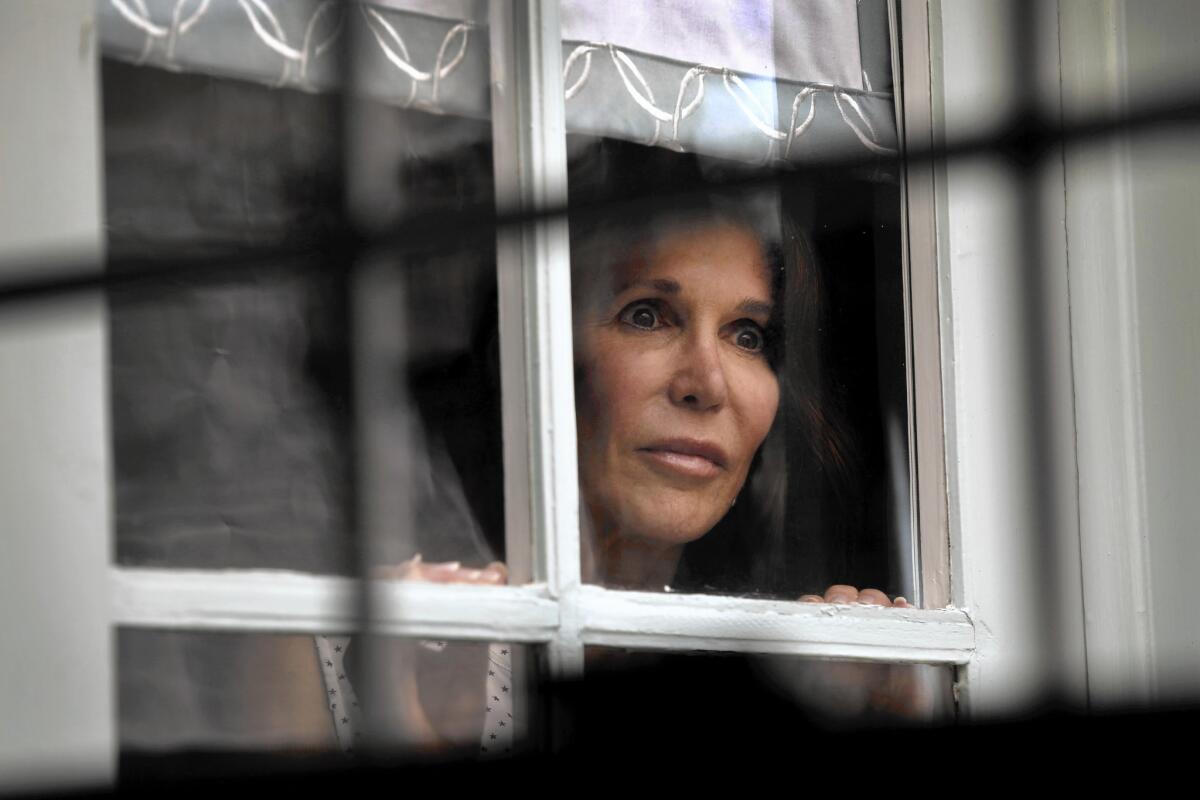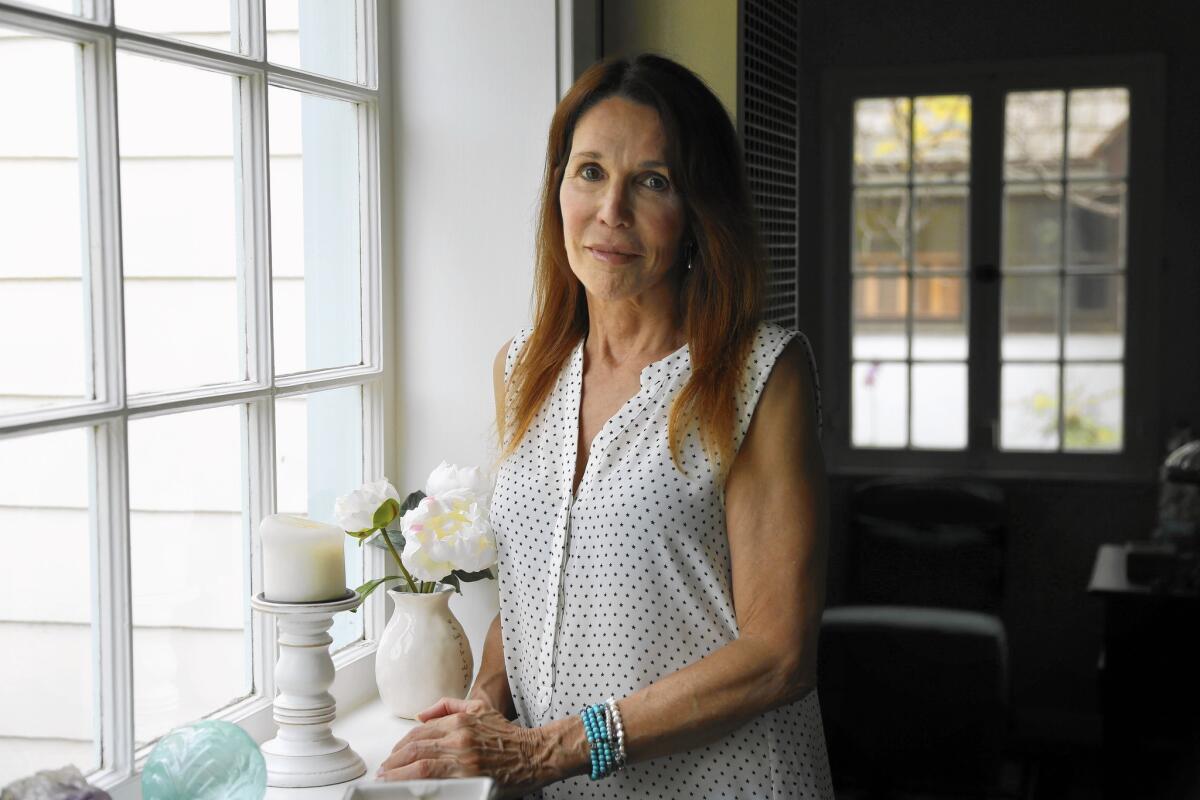Youāre taking care of someone with Alzheimerās, but who is taking care of you?

Patti Davis founded the Beyond Alzheimerās support group for caregivers.
After Ronald Reagan became Americaās most recognizable Alzheimerās patient, well-meaning friends, relatives and even strangers would routinely stop his daughter, Patti Davis, to ask: āHow is he doing?ā
Only occasionally would someone ask, āAnd how are you doing?ā
Itās understandable, of course, to focus on the patient. But Davisā experience during her late fatherās years-long battle led her to form a free weekly support group ā Beyond Alzheimerās. The nearly 5-year-old group moves next month from UCLA to St. Johnās in Santa Monica but continues the same mission: to care for the caregivers.
āPeople come [to the support group] for the first time and theyāre armed with all these facts about their mother or their father. They say, āTheyāre on this medication, they were diagnosed on this date, and their doctors say this and that.ā And then I say to them, āHow are you doing?ā And thereās this moment where they have to process the question and, almost inevitably, thatās when the tears come. It might be the first time in a year or more or ever that theyāve been asked, āBut how are you doing.āā
More than 5 million Americans live with Alzheimerās, and the numbers may only get worse as baby boomers age. We asked Davis for some advice for the sandwich generation, those run ragged as they are caught between raising kids and caring for aging parents, not to mentions career demands. Hereās what she had to say:
Why is this disease especially grueling for caregivers?
Caregiver stress is a very real thing. The person who has Alzheimerās, they donāt experience stress in the same way that a caregiver does. For them, every moment is new. The caregivers are the ones that worry about the future and worry about the past and worry about the present. Theyāre constantly worrying about finances, what is going to happen next, it never lets up. But they feel like, āI donāt have the disease, Iām not entitled to the attention.ā They start to feel less important, less significant. On an airplane, when they give you the lecture about the oxygen mask, youāre told to put on your own mask first before you help a young child or the elderly or the disabled. And I use that analogy a lot. Caregivers have to take care of themselves first. They are entitled to have their feelings understood and nurtured and discussed.

Patti Davis, 63, is the founder of the Beyond Alzheimerās support group that is currently held at the UCLA Medical Center in Santa Monica but will soon be moving to St. John Providence Health Center.
There is also another kind of guilt. There are difficult things that come up that other people just donāt understand. Sometimes caregivers are dealing with someone who can no longer speak or is bedridden. And they wish it would be over, theyāre wishing that death would come. They feel really self-conscious about admitting this to anyone else. Someone on the outside would say, āāThatās terrible, thatās a terrible thing to say.ā But [inside the support group], we all get it. That wish for it to be over. Weāre a safe place where you can admit that.
You say the earlier stages of the disease are actually the most difficult for caregivers. That seems counterintuitive, what does that mean?
They are the most difficult stages. The person who has the disease knows thereās something wrong with them and they are terrified. They are losing their grip on everything that they know that is familiar. I remember my father standing in the living room of my parentsā home and saying, āI donāt know where I am.ā It was devastating. Itās another oddity of this disease that as it progresses and gets worse for the patient, things can actually get easier on the caregiver, but that also comes with its own type of guilt for the caregiver.
Because thatās when people may have to decide to place a loved one in a facility?
Yes, and itās one of the most wrenching decisions that anyone will have to make. People say, āI canāt do that, Iāll be abandoning them.ā And I say, āNo. If you took them out to the Mohave Desert and threw them out of the car and drove away, that would be abandonment. Putting them someplace where they will be cared for 24/7, with structure ā which is very important for Alzheimerās ā and access to medical care at all times ā¦ is one of the most loving things you can do.ā
What is an average meeting like? Why do you hold this at a hospital? Isnāt that the last place people want to go do?
I wanted to do it at a hospital because itās symbolic. The family members and caregivers should be treated as patients. It adds a lot of power to that message if youāre physically sitting at a hospital.
I run the meetings with a co-facilitator, usually a neurologist or a neuropsychologist or another guest speaker. We offer perspectives and other information for a few minutes. And then we go around the table and each person can talk about what they are going through. Or they can opt not to talk. We go in an orderly movement around the table. Sometimes people have practical suggestions. A common issue [with Alzheimer patients] is not wanting to bathe. So someone might have a suggestion on how they dealt with that.
What toll does this take on you?
In all the years Iāve been doing this, I only missed one night, and that was because I was in the middle of moving. I think itās so important. I feel like Iām on a mission, but I also get something out of it too. When I share experiences that I had with my father, it helps me too. But the idea that people can come here and feel less alone and feel less isolated and get some really good feedback is just so gratifying to me.
The Beyond Alzheimerās support group will meet from 6:30 to 8 p.m. Tuesdays and Thursdays at St. Johnās Health Center in Santa Monica starting May 3. Call (310) 829-5511 for location.











